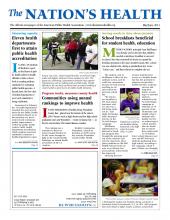A new method to predict menopause as many as two years in advance could go a long way in slowing bone loss and cardiovascular disease in women, according to a recent study.
Predicting menopause with a formula that tracks hormone levels, rather than irregular menstrual bleeding, can lead to earlier interventions to reduce bone loss that starts as early two years prior to a woman’s final period, said Arun Karlamangla, MD, a study author and assistant professor in medicine at the David Geffen School of Medicine’s Division of Geriatrics at the University of California, Los Angeles. The study was published online March 26 in the Journal of Clinical Endocrinology and Metabolism.
“We’re all interested in when osteoporosis actually starts and when women start losing bone mass,” Karlamangla told The Nation’s Health. “There are hormonal changes happening even prior to (being) post-menopausal.”
Menopause occurs when a woman’s body is producing less estrogen, and less estrogen leads to bone loss that can result in fractures, according to the U.S. Department of Health and Human Services’ Office on Women’s Health. Women experience rapid bone loss within the first four to eight years of menopause, according to the National Institutes of Health.
Researchers used data from the Study of Women’s Health Across the Nation, a National Institutes of Health-sponsored study that monitored 554 women — starting in their 40s — for more than a decade, he said.
Researchers compared levels of the estrogen hormone and follicle-stimulating hormone — a hormone released from the brain that tells ovaries to ovulate. Levels were measured from the three years prior to a woman’s final menstrual cycle to the levels they had while in their 40s, he said.
During menopause, the follicle-stimulating hormone continues to increase, while estrogen levels drop. Estrogen levels drop because the ovaries stop producing estrogen during menopause. That drop leads to symptoms such as hot flashes, he said.
With the early knowledge, women can begin increasing their calcium and vitamin D intake to build their bone strength, he said. Weaker bones can lead to fractures, such as back fractures, which can be “very painful” Karlamangla said. In addition, a nutritious diet, low cholesterol and exercise help reduce cardiovascular disease, he said.
“There are fractures of the hip, but people don’t recover their prime level of functioning,” Karlamangla said. “Repairing fractures are a major drain on our health care, fractures in older women and in older men.”
Karlamangla said the study’s findings offer promise but that the predictive method needs additional validation before becoming common practice.
“Some physicians might — the academic types — but it’s not a commonplace thing,” Karlamangla said. “We would not push for people to start using it until it’s been validated.” For more information, visit http://jcem.endojournals.org/content/early/2013/03/22/jc.2012-3732.full.pdf+html.
- Copyright The Nation’s Health, American Public Health Association









